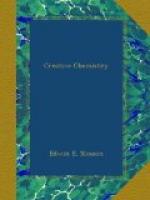It is amusing to turn back to the pure food agitation of ten years ago and read the sensational articles in the newspapers about the poisonous nature of this dangerous drug, saccharin, in view of the fact that it is being used by millions of people in Europe in amounts greater than once seemed to upset the tender stomachs of the Washington “poison squads.” But saccharin does not appear to be responsible for any fatalities yet, though people are said to be heartily sick of it. And well they may be, for it is not a substitute for sugar except to the sense of taste. Glucose may correctly be called a substitute for sucrose as margarin for butter, since they not only taste much the same but have about the same food value. But to serve saccharin in the place of sugar is like giving a rubber bone to a dog. It is reported from Europe that the constant use of saccharin gives one eventually a distaste for all sweets. This is quite likely, although it means the reversal within a few years of prehistoric food habits. Mankind has always associated sweetness with food value, for there are few sweet things found in nature except the sugars. We think we eat sugar because it is sweet. But we do not. We eat it because it is good for us. The reason it tastes sweet to us is because it is good for us. So man makes a virtue out of necessity, a pleasure out of duty, which is the essence of ethics.
In the ancient days of Ind the great Raja Trishanku possessed an earthly paradise that had been constructed for his delectation by a magician. Therein grew all manner of beautiful flowers, savory herbs and delicious fruits such as had never been known before outside heaven. Of them all the Raja and his harems liked none better than the reed from which they could suck honey. But Indra, being a jealous god, was wroth when he looked down and beheld mere mortals enjoying such delights. So he willed the destruction of the enchanted garden. With drought and tempest




